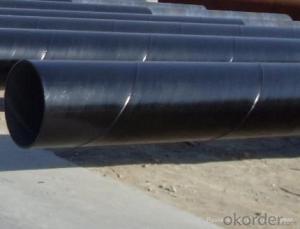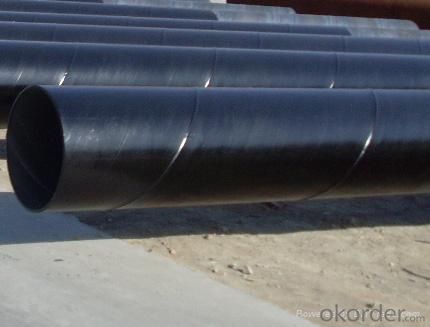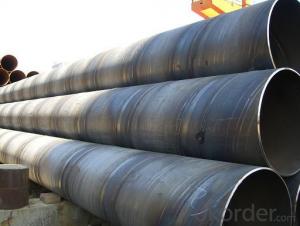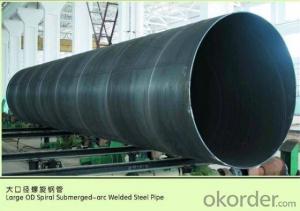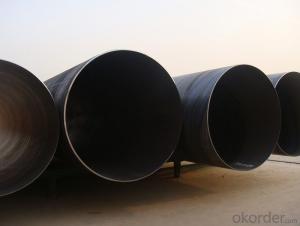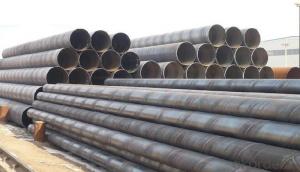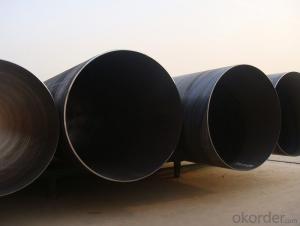SPIRAL STEEL PIPE 42’‘46’‘48‘‘50’‘ LARGE DIAMETER PIPE
- Loading Port:
- Tianjin
- Payment Terms:
- TT OR LC
- Min Order Qty:
- 5 m.t.
- Supply Capability:
- 3000 m.t./month
OKorder Service Pledge
OKorder Financial Service
You Might Also Like
Packaging & Delivery
Packaging Detail: | standard export packing or as customer's requirement |
Delivery Detail: | within 10 - 30 days |
Specifications
Spiral Welded Steel Pipes and Tubes
1.Material:Q195-Q235
2.Length:1-12m
3.WT:1.0-14mm
4.O.D.:20-273mm
Spiral Welded Steel Pipes and Tubes
Product Description:
1.Material : Q235,Q345,L245,L290,L360,L415,L450,L485,GrB,X42,46,X52,X56,X60,X65,X70,X80,X100
2,Standard: SY/T5037-2000,GB/T9711-2011,API Spec 5L PSL1/PSL2,ASTM A252\A53,ISO3183,DIN17172,EN10217,JIS G3457,AWWA C200,ASTM A139,ASTM A671,ASTM A672
3.Wall thickness: 3.0mm-30mm
4.Outer diameter: φ168mm-3020mm
5,Length: 5m-12m or as your requirement
6,Corrosion protection standard: DIN30670,DIN30671, AWWAC210, AWWA C203, SY/T0413-2002,SY/T0414-2002
7,Application: Oil, gas, natural gas, water pipe, thermal electricity pipe, steel structure engineering, etc
Q195-q345 Material Steel Pipe's Materials
Elements | Chemical Compsition% | Mechanical Property | ||||||
C% | Mn% | S% | P% | Si% | Yield Point (Mpa) | Tensile Strength(Mpa) | Elongation | |
Q195 | 0.06-0.12 | 0.25-0.50 | <0.050< span=""> | <0.045< span=""> | <0.030< span=""> | >195 | 315-430 | 32-33 |
Q215 | 0.09-0.15 | 0.25-0.55 | <0.05< span=""> | <0.045< span=""> | <0.030< span=""> | >215 | 335-450 | 26-31 |
Q235 | 0.12-0.20 | 0.30-0.70 | <0.045< span=""> | <0.045< span=""> | <0.030< span=""> | >235 | 375-500 | 24-26 |
Q345 | <0.20< span=""> | 1.0-1.6 | <0.040< span=""> | <0.040< span=""> | <0.55< span=""> | >345 | 470-630 | 21-22 |
- Q: How do you determine the required support spacing for steel pipes?
- Various factors, including the diameter of the pipe, the strength of the material, the operating conditions, and local building codes and regulations, determine the required support spacing for steel pipes. When considering the diameter of the pipe, it is crucial to note that larger pipes generally need more frequent support to prevent excessive deflection and sagging compared to smaller pipes. The strength of the material is also a significant consideration, as pipes with greater strength can span longer distances without requiring additional support. The operating conditions of the pipe, such as the type of fluid being transported and the temperature, also play a role in determining the necessary support spacing. For instance, pipes carrying heavy or corrosive fluids may require more frequent support to prevent excessive stress and potential failure. Local building codes and regulations often provide specific guidelines for the minimum support spacing of steel pipes. These regulations take into account factors such as the diameter of the pipe, the strength of the material, the operating conditions, as well as safety and structural requirements. To accurately determine the required support spacing for steel pipes, it is essential to consult relevant codes, standards, and engineering guidelines. Additionally, working with qualified engineers and professionals experienced in pipe design and installation will ensure that the support spacing meets all necessary requirements, ensuring the safe and efficient operation of the piping system.
- Q: What is the difference between seamless and ERW steel pipes?
- Seamless steel pipes are manufactured without any welding or seams, resulting in a uniform and continuous structure. On the other hand, ERW (Electric Resistance Welded) steel pipes are created by welding the edges of the steel strip or plate together to form a tube. This welding process can cause a visible seam along the length of the pipe. While seamless pipes are generally considered stronger and more reliable due to their uninterrupted structure, ERW pipes are more cost-effective and readily available.
- Q: What is the standard length of steel pipes?
- The standard length of steel pipes varies depending on the industry and application, but common lengths range from 10 to 40 feet.
- Q: What are the different coating options for steel pipes?
- There are several different coating options available for steel pipes, including fusion bonded epoxy (FBE) coating, three-layer polyethylene (3LPE) coating, three-layer polypropylene (3LPP) coating, coal tar enamel (CTE) coating, and zinc coating. These coatings help to protect the steel pipes from corrosion and extend their lifespan.
- Q: Can steel pipes be used for natural gas processing plants?
- Yes, steel pipes can be used for natural gas processing plants. Steel pipes are commonly used in the oil and gas industry due to their high strength, durability, and resistance to corrosion. They can safely transport natural gas and are capable of withstanding the high pressure and temperature conditions typically found in processing plants.
- Q: Can steel pipes be used for hydroelectric power plants?
- Yes, steel pipes can be used for hydroelectric power plants. Steel pipes are commonly used in hydroelectric power plants for various applications. They are primarily used in the penstock, which is a pipe that carries water from the reservoir to the turbine. The penstock is under high pressure, and steel pipes have the necessary strength and durability to handle the pressure and flow of water. Steel pipes are preferred in hydroelectric power plants due to their high tensile strength, corrosion resistance, and longevity. They can withstand the high-pressure conditions and flow rates of water, ensuring the efficient transfer of water from the reservoir to the turbine. Additionally, steel pipes have the advantage of being easily fabricated and installed. They can be customized to fit specific project requirements and can be welded or bolted together to form the desired length and shape. Furthermore, steel pipes are cost-effective compared to other materials commonly used in hydroelectric power plants, such as concrete or fiberglass. They provide a reliable and cost-efficient solution for conveying water in hydroelectric power plants, contributing to the overall efficiency and effectiveness of the power generation process. In conclusion, steel pipes are a suitable and commonly used material for hydroelectric power plants. They offer the necessary strength, durability, and cost-effectiveness required for conveying water from the reservoir to the turbine, making them an ideal choice for this application.
- Q: Are there specifications for scaffold steel pipe with 48mm * 3.2mm?
- Scaffold tubes are our name for materials used to build scaffolding, because most scaffolding uses tubular bamboo or steel tubing. Bamboo and other bamboo is for a long time in the use of the scaffolding tube, but due to lack of safety and durability, now only in rural and urban area construction is lagging behind some of the home building small building has been used. The modernization construction, the most commonly used type of scaffolding pipe is steel pipe, the scaffolding should not only meet the demand of workers, but also to meet the characteristics of scaffolding firm and durable, so tough hard steel is the best choice. The selected steel pipe generally requires smooth surface, no cracks, no bending, no rust, and meet the relevant national standards.
- Q: What are the different types of pipe fittings used with steel pipes?
- Some of the different types of pipe fittings used with steel pipes include elbows, tees, couplings, unions, flanges, and reducers.
- Q: Can steel pipes be used for conveying hazardous materials?
- Yes, steel pipes can be used for conveying hazardous materials. Steel pipes are known for their durability, strength, and resistance to corrosion, making them suitable for transporting various hazardous substances such as chemicals, gases, and liquids. Additionally, steel pipes can withstand high pressures and temperatures, ensuring the safe and efficient transportation of hazardous materials. However, it is important to ensure proper handling, maintenance, and adherence to safety regulations when using steel pipes for conveying hazardous materials.
- Q: Do steel pipes require maintenance?
- Yes, steel pipes do require maintenance. Regular maintenance is necessary to ensure their proper functioning and longevity. This may involve cleaning, inspecting for any signs of corrosion or damage, and applying protective coatings to prevent rusting. Additionally, periodic maintenance checks and repairs may be needed to address any leaks or structural issues that may arise over time.
Send your message to us
SPIRAL STEEL PIPE 42’‘46’‘48‘‘50’‘ LARGE DIAMETER PIPE
- Loading Port:
- Tianjin
- Payment Terms:
- TT OR LC
- Min Order Qty:
- 5 m.t.
- Supply Capability:
- 3000 m.t./month
OKorder Service Pledge
OKorder Financial Service
Similar products
Hot products
Hot Searches
Related keywords
